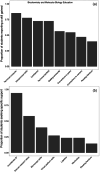Remodeling pedagogical evaluation tools to incorporate student self-efficacy and sense of belonging in scientific research
- PMID: 39778058
- PMCID: PMC11910173
- DOI: 10.1002/bmb.21881
Remodeling pedagogical evaluation tools to incorporate student self-efficacy and sense of belonging in scientific research
Abstract
Curated undergraduate research experiences have been widely used at colleges and universities for decades to build student interest, technical preparation, and confidence in the pursuit of scientific careers. Educators often employ standardized survey instruments to evaluate learning outcomes for research experiences, but many of these assessments consider only technical skill development and career interests and are not rooted in discrete pedagogical theories. As higher education aims to create inclusive and equitable learning experiences for students, we argue that pedagogical assessment tools for undergraduate research experiences need to expand to consider outcomes such as increased science literacy, confidence in relational "soft" skills, and a sense of belonging to a community that values scientific inquiry. We report on and critique a survey instrument that uses validated metrics to evaluate student sense of belonging and the relational skills developed during an undergraduate research experience. We also provide a revised survey instrument that is founded in social and emotional learning principles and expectation disconfirmation theory. We describe best practices for remodeling the undergraduate research environment to prioritize these inclusive learning objectives alongside publishable research output that is sought by research advisors. Survey tools, like the one described here, are critical for helping colleges and universities train students in science while evolving to promote inclusivity, self-efficacy, and sense of belonging. Higher education programs will continue to produce scientists, but a focus on confidence-building and soft-skill development is essential for creating a general population that is scientifically literate and supportive and trusting of the scientific process.
Keywords: evaluation; inclusion; sense of belonging; undergraduate research.
© 2025 The Author(s). Biochemistry and Molecular Biology Education published by Wiley Periodicals LLC on behalf of International Union of Biochemistry and Molecular Biology.
Conflict of interest statement
The authors declare no competing interests in this research project.
Figures

References
-
- US Bureau of Labor Statistics . Employment in STEM occupations. Washington DC: UC Bureau of Labor Statistics; 2022. https://www.bls.gov/emp/tables/stem-employment.htm
-
- Chen X. STEM attrition: college students' paths into and out of STEM fields. Statistical analysis report. NCES 2014–001. Washington, DC: National Center for Education Statistics; 2013.
-
- Xu YJ. Career outcomes of STEM and non‐STEM college graduates: persistence in majored‐field and influential factors in career choices. Res High Educ. 2013;54(3):349–382.
-
- Xu YJ. Attrition of women in STEM: examining job/major congruence in the career choices of college graduates. J Career Dev. 2017;44(1):3–19.
-
- Ceyhan GD, Tillotson JW. Early year undergraduate researchers' reflections on the values and perceived costs of their research experience. Int J STEM Educ. 2020;7(1):54. 10.1186/s40594-020-00248-x - DOI
Publication types
MeSH terms
Grants and funding
LinkOut - more resources
Full Text Sources
Research Materials

